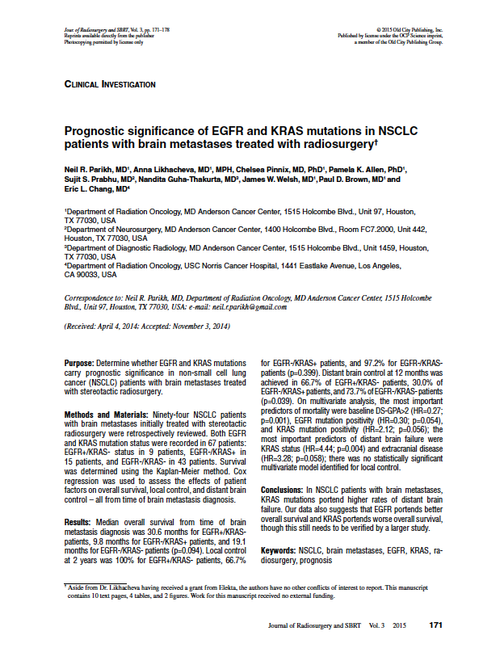- Home
- Journal Contents Downloads
- JRSBRT Downloads
- JRSBRT 3.3, p. 171-178
Product Description
Prognostic significance of EGFR and KRAS mutations in NSCLC patients with brain metastases treated with radiosurgery
Neil R. Parikh, Anna Ilkhacheva, MPH, Chelsea Pinnix, Pamela K. Allen, Sujit S. Prabhu, Nandita Guha-Thakurta, James W. Welsh, Paul D. Brown and Eric L. Chang
Purpose: Determine whether EGFR and KRAS mutations carry prognostic significance in non-small cell lung cancer (NSCLC) patients with brain metastases treated with stereotactic radiosurgery.
Methods and Materials: Ninety-four NSCLC patients with brain metastases initially treated with stereotactic radiosurgery were retrospectively reviewed. Both EGFR and KRAS mutation status were recorded in 67 patients: EGFR+/KRAS- status in 9 patients, EGFR-/KRAS+ in 15 patients, and EGFR-/KRAS- in 43 patients. Survival was determined using the Kaplan-Meier method. Cox regression was used to assess the effects of patient factors on overall survival, local control, and distant brain control – all from time of brain metastasis diagnosis.
Results: Median overall survival from time of brain metastasis diagnosis was 30.6 months for EGFR+/KRASpatients, 9.8 months for EGFR-/KRAS+ patients, and 19.1 months for EGFR-/KRAS- patients (p=0.094). Local control at 2 years was 100% for EGFR+/KRAS- patients, 66.7% for EGFR-/KRAS+ patients, and 97.2% for EGFR-/KRASpatients (p=0.399). Distant brain control at 12 months was achieved in 66.7% of EGFR+/KRAS- patients, 30.0% of EGFR-/KRAS+ patients, and 73.7% of EGFR-/KRAS- patients (p=0.039). On multivariate analysis, the most important predictors of mortality were baseline DS-GPA>2 (HR=0.27; p=0.001), EGFR mutation positivity (HR=0.30; p=0.054), and KRAS mutation positivity (HR=2.12; p=0.056); the most important predictors of distant brain failure were KRAS status (HR=4.44; p=0.004) and extracranial disease (HR=3.28; p=0.058); there was no statistically significant multivariate model identified for local control.
Conclusions: In NSCLC patients with brain metastases, KRAS mutations portend higher rates of distant brain failure. Our data also suggests that EGFR portends better overall survival and KRAS portends worse overall survival, though this still needs to be verified by a larger study.
Keywords: NSCLC, brain metastases, EGFR, KRAS, radiosurgery, prognosis
After payment has been processed for your order of a digital copy (PDF) of this article, you will see a download link on your completed order page and also receive an email containing a download link. The links, which will enable you to download one copy of the article, will expire after 24 hours.
 Loading... Please wait...
Loading... Please wait...



